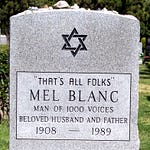
I’ve been writing these word posts for a year now. It’s hard to believe. I’ve covered over a hundred words and their cognates because I started this as a twice weekly posting, but then I decided to drop it down to once a week. If you’ve been with me from the start, thanks for sticking with me. If you’ve joined somewhere along the way, thanks for coming along for the ride. I’m going to continue doing these. The hope and even the plan is still to compile them into a book a some point, but for now, there are many more words out there to discuss.
anniversary — the yearly recurrence of a special date
aniversario — the Spanish cognate of the same meaning
anniversario — the Italian cognate of the same meaning
At the root of these words is the Latin word annus which means “year.” We’ve come to use the word “anniversary” in a much looser way to acknowledge a special date even weeks or months after it happened. Thus, we say things like, “It’s our six-month anniversary.” While this is all fine and dandy, it’s kind of comical, too, when you think about it since the word is based upon the Latin word for “year.” In reality, an “anniversary” can only be used to mark something that comes around yearly, or annually.
“Annual” also has the word annus as its root. An “annual” occurrence happens each year. In high school, I was editor of our yearbook, and we always called it the “annual” because it came out once a year, unlike the school newspaper which came out monthly. The Spanish cognate is “anual,” and the Italian one is “annuale.”
Knowing that these words refer to things that happen on a yearly basis and that they come from the word annus helps you learn and easily remember the Spanish word for “year.” It is “año.” It is used often, so it comes up early in Spanish vocabulary lessons.
When you want to say how old you are in Spanish, you are actually announcing how many years you have. Thus, you say something like, “Tengo treinta años” for “I’m thirty years old.” (Literally, it translates to “I have thirty years.”)
The word pops up in the common Spanish word of “cumpleaños” which means “birthday.” Essentially, it’s the day in which you “complete” another “year.” The Italian word for “year” is “anno” which is much similar to its Latin ancestor, and the Italian word for “birthday” is “compleanno.” You can see that it’s very similar to the Spanish word.
In tracking our dates, we use the term A.D. This is Italian for “anno Domini,” which means “the year of our Lord.”
Hopefully, in a year, I’ll be acknowledging the second “anniversary” of “Cognate Cognizance.” Help me grow my readership by sharing this with others who are interested in words.
Thanks.
Tammy Marshall













Share this post